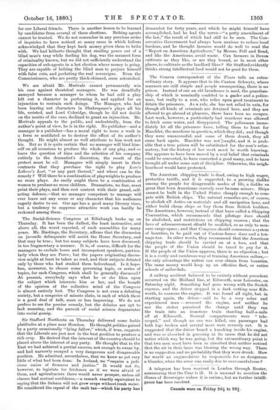We are afraid Mr. Merivale cannot permanently win his case
against theatrical managers. He was dreadfully annoyed because a manager to whom he had sold a play left out a character in performing it, and applied for an injunction to restrain such doings. The Manager, who had been leaving out characters in Shakespeare's plays all his life, resisted, and Lord Coleridge, though he did not decide on the merits of the case, declined to grant an injunction. Mr. Merivale appeals to the public, and undoubtedly, from the author's point of view, he is in the right. No publisher—and a manager is a publisher—has a moral right to issue a work in a form so mutilated as to destroy the effect of its author's thought. He might almost as well attribute to him work not his. But as it is quite certain that no manager will bind him- self on all occasions to produce the whole of any play, and so leave the question of time and the selection of his company entirely to the dramatist's discretion, the result of the protest must be nil. Managers will simply insert in their contracts that they purchase the right to play Love's Labour's Lost, "or any part thereof," and where can be the remedy ? Will there be a combination of playwrights to produce no more plays. As easily might there be a combination of women to produce no more children. Dramatists, we fear, must print their plays, and then rest content with their grand, self- acting defence,—that no manager competent to manage will ever leave out any scene or any character that his audiences eagerly desire to see. Our age has a good many literary vices, but a tendency to suppress attractive work can hardly be reckoned among them.


































 Previous page
Previous page